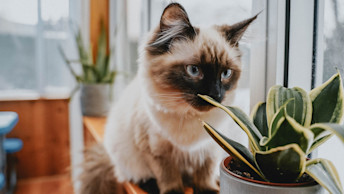June 3, 2024
What Plants Are Toxic to Cats?

Adding plants and flowers to your home is a great way to decorate and brighten up your space. However, many cat parents may keep common plants throughout the house without knowing how deadly they can be for their feline friends.
As a cat owner, it's critical to know which plants commonly found in homes and gardens can pose a danger to your pet. Armed with this knowledge, you can take simple precautions to deter your cat from toxic plants and avoid the dangers of plant poisoning altogether.

Please note: This is not a comprehensive list of what plants are toxic to cats. Various plants may have differing effects on feline health, and it's crucial to conduct thorough research before introducing new plants into your home. For comprehensive guidance on which plants are safe or potentially harmful to your pets, we recommend consulting reputable sources such as the ASPCA's extensive database of toxic and non-toxic plants, or speaking directly with your veterinarian. Taking these steps ensures the well-being of your cherished pets and keeps your living space both beautiful and safe for them.
Common Plants Poisonous to Cats
These plants range from extremely toxic to mildly toxic. Avoid exposing your cat to these common plants:
Lilies
All parts of lilies are extremely toxic to cats, even in small doses. Eating any part of the plant - leaves, pollen, flowers or water from the vase - can cause kidney failure and death in cats7.
Pothos
Pothos (Epipremnum aureum) is an extremely popular houseplant known for its trailing vines and ease of care. Pothos is considered toxic to cats, and ingestion can cause oral irritation, drooling, vomiting, and difficulty swallowing4.
ZZ Plant
ZZ plant (Zamioculcas zamiifolia) , despite being often recommended for pet owners, contains calcium oxalate crystals. When consumed, these can cause vomiting, diarrhea, and oral irritation in cats2.
Jade Plant
Jade plant (Crassula ovata) is considered toxic to cats and may cause vomiting, diarrhea, nausea, and incoordination if ingested6.
Snake Plant
Snake plant (Sansevieria trifasciata), also known as mother-in-law's tongue, can cause nausea, vomiting, or diarrhea if ingested9.
Aloe Vera
Aloe vera can cause vomiting, lethargy and diarrhea if eaten and is considered toxic to cats1.
Tomato Plant
The green parts of the tomato plant, including stems, leaves, and unripe fruit, contain solanine. This can cause gastrointestinal upset, drooling, vomiting, diarrhea, and lack of appetite11. Ripe tomatoes contain very limited solanine, as the content reduces during the ripening process, as and such ripe tomatoes are considered safe11.
Lavender
Consumption of the lavender plant in small amounts is not generally severely toxic, but larger ingestions can cause vomiting, diarrhea, and lack of appetite5.
Peace Lily
Ingestion of peace lily can irritate the mouth and esophagus. It contains calcium oxalate crystals that can lead to excessive drooling, vomiting, and difficulty swallowing8.
Arrowhead Plant
The arrowhead plant contains calcium oxalate crystals. Ingestion of the leaves or stems can lead to oral irritation, excessive drooling, vomiting, and lack of appetite3.
Swiss Cheese Plant
Ingestion of Monstera deliciosa, also known as the Swiss cheese plant, can irritate the mouth, tongue, and lips. It contains calcium oxalate crystals that can cause oral pain, drooling, vomiting, and difficulty swallowing10.
Ficus Plants
Plants from the Ficus genus, which includes the Weeping Fig (Ficus benjamina) and the Indian Rubber Plant (Ficus elastica) among others, are generally considered mildly toxic to cats12,13. Ingestion of these plants can result in symptoms such as mouth irritation, vomiting, diarrhea, and decreased appetite13.
Non-Toxic Plants
Certain houseplants are considered non-toxic for cats. These plants can be safely kept in homes with feline companions.
Some examples of non-toxic houseplants include:
- Prayer Plant (Calathea insignis)
- Parlor Palm (Chamaedorea elegans)
- Spider Plant (Chlorophytum comosum)
- Bamboo (Phyllostachys aurea)
- Money Tree (Pachira aquatica)
- Strawberry (Fragaria spp.)
- Jasmine (Jasminum species)
- Zebra Haworthia (Haworthia fasciata)
- Chinese Money Plant (Pilea peperomioides)
- American Rubber Plant (Peperomia obtusifolia)
Including non-toxic plants in your home not only beautifies your living space but also creates a safe and stimulating environment for your feline friends.

Conclusion
Cats are curious creatures that like to explore their environment and often taste test our house plants. Unfortunately, many common houseplants are toxic to cats and can cause serious poisoning if ingested. As cat owners, we must be aware of which houseplants are dangerous and take precautions to keep our furry friends safe.
All potentially toxic plants should be kept out of reach of cats. If you suspect your cat has eaten part of a toxic plant, seek veterinary treatment immediately. The sooner the poisoning is addressed, the better the chance of recovery.
While houseplants pose some dangers, there are also many safe, pet-friendly options for plant lovers. With proper precautions, cat owners can enjoy decorative plants without putting their cats at risk. By being aware of what plants are toxic to cats, we can cultivate both a beautiful home and a healthy, thriving cat.
"Aloe." ASPCA. Accessed March 13, 2024. https://www.aspca.org/pet-care/animal-poison-control/toxic-and-non-toxic-plants/aloe.
"Are ZZ Plants Toxic to Cats?" Hepper. Accessed March 13, 2024. https://www.hepper.com/are-zz-plants-toxic-to-cats/.
"Arrowhead Vine." Pet Poison Helpline. Accessed March 13, 2024. https://www.petpoisonhelpline.com/poison/arrowhead-vine/.
"Golden Pothos." ASPCA. Accessed March 13, 2024. https://www.aspca.org/pet-care/animal-poison-control/toxic-and-non-toxic-plants/golden-pothos.
"Is Lavender Safe for Cats?" The Dodo. Accessed March 13, 2024. https://www.thedodo.com/dodowell/is-lavender-safe-for-cats.
"Jade Plant." ASPCA. Accessed March 13, 2024. https://www.aspca.org/pet-care/animal-poison-control/toxic-and-non-toxic-plants/jade-plant.
"Lovely Lilies and Curious Cats: A Dangerous Combination." U.S. Food & Drug Administration. Accessed March 13, 2024. https://www.fda.gov/animal-veterinary/animal-health-literacy/lovely-lilies-and-curious-cats-dangerous-combination.
"Peace Lily." ASPCA. Accessed March 13, 2024. https://www.aspca.org/pet-care/animal-poison-control/toxic-and-non-toxic-plants/peace-lily.
"Snake Plant." ASPCA. Accessed March 13, 2024. https://www.aspca.org/pet-care/animal-poison-control/toxic-and-non-toxic-plants/snake-plant.
"Swiss Cheese Plant." ASPCA. Accessed March 13, 2024. https://www.aspca.org/pet-care/animal-poison-control/toxic-and-non-toxic-plants/swiss-cheese-plant.
"Tomato Plant." ASPCA. Accessed March 13, 2024. https://www.aspca.org/pet-care/animal-poison-control/toxic-and-non-toxic-plants/tomato-plant.
"Weeping Fig." ASPCA. Accessed March 13, 2024. https://www.aspca.org/pet-care/animal-poison-control/toxic-and-non-toxic-plants/weeping-fig.
"Weeping Fig." Pet Poison Helpline. Accessed March 13, 2024. https://www.petpoisonhelpline.com/poison/weeping-fig/.



